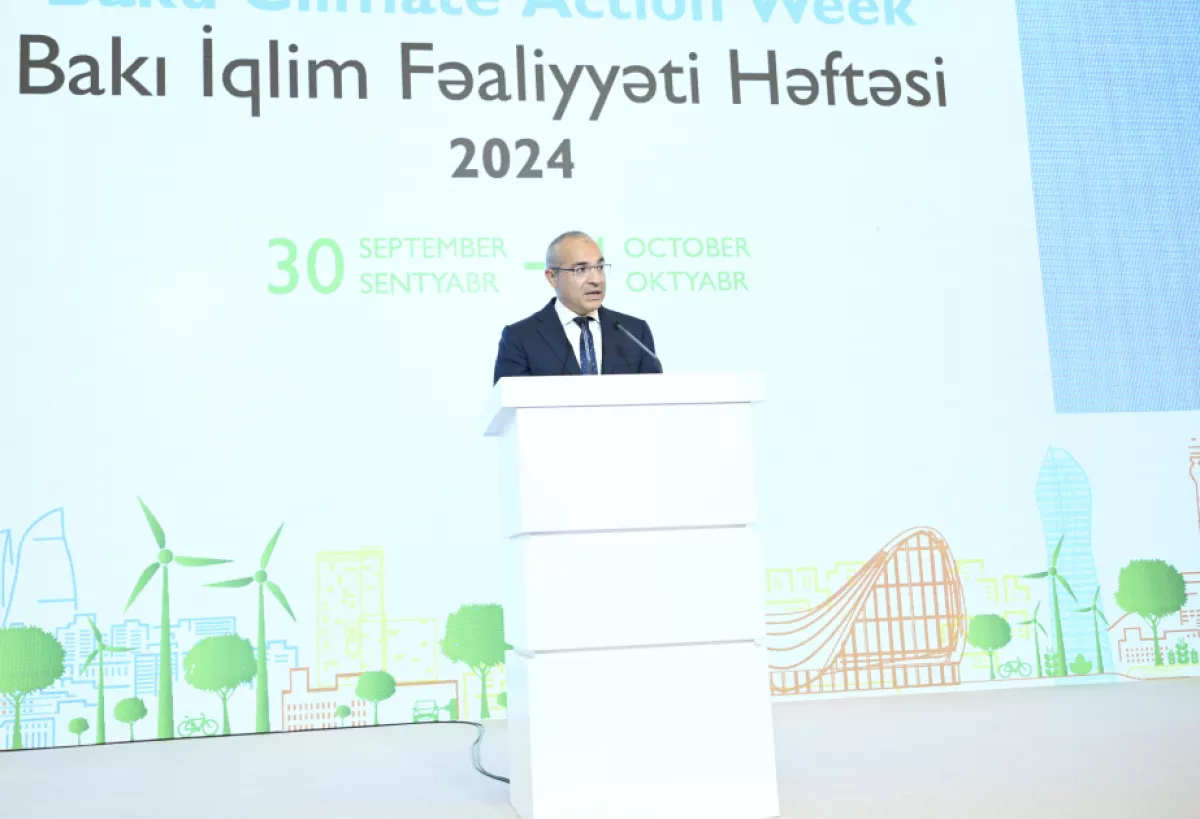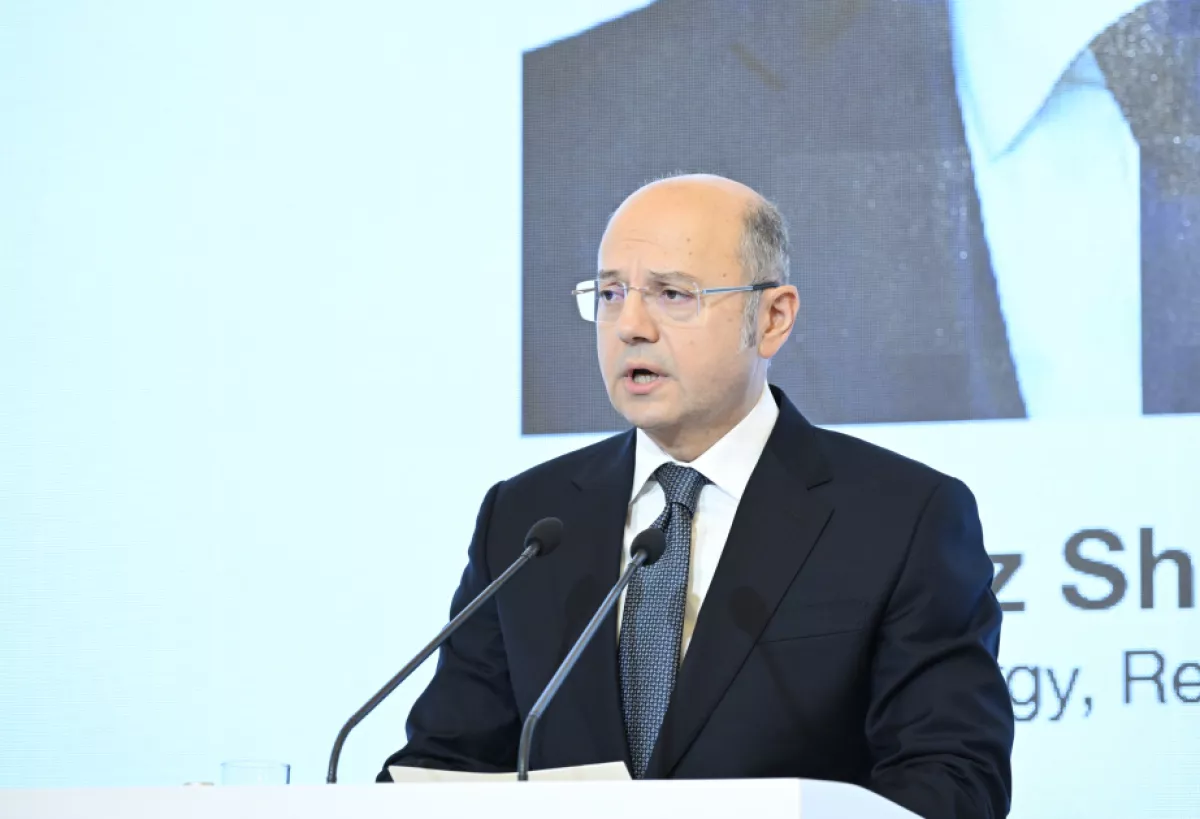Baku defines "green" priorities within Climate Action Week Paving the way for COP29
One of the key challenges humanity must address in the 21st century is overcoming the negative consequences of global climate change. According to the UN Framework Convention on Climate Change and the Kyoto Protocol, the main focus is on the decarbonization of industries to reduce CO2 emissions, the development of “green” energy, addressing water scarcity issues, and the safe disposal of waste, as well as the introduction of energy efficiency mechanisms in cities.
Azerbaijan will host discussions on this wide range of issues during the upcoming COP29 UN Climate Conference scheduled for November. In the lead-up to this forum, an international conference is taking place in Baku from September 30 to October 4, 2024, as part of the Baku Climate Action Week (BCAW2024).
In preparation for COP29, a decision was made to discuss the existing risks in the climate sector and outline ways to mitigate their consequences. To this end, representatives of international organizations and experts in the fields of policy, finance, trade, investment, science, civil society, and the media have gathered in Baku for the BCAW2024. The first half of the week (September 30 – October 2) will be dedicated to discussing climate solutions involving government institutions, academia, and the private sector. Key themes for the discussions during Baku Climate Week will focus on topics such as the "energy transition," "urban and city challenges," "water security," "food and agriculture issues," "small and medium enterprises," and "green skills."
Nigar Arpadarai, the UN High-Level Climate Leader for COP29, during her speech at BCAW2024, said, "The climate crisis is no longer a distant threat—it is already here, affecting all of us—from the air we breathe to the water we drink, from the food we grow to the homes we build. Soon, we will gather the climate community in Baku at COP29: our vision for this event is crystal clear—it is aimed at raising ambitions and taking concrete action to address the climate crisis."
"This vision cannot be implemented alone. We need the innovation, knowledge, and commitment of all stakeholders—from businesses and civil society to cities and academic institutions—and Baku Climate Week is seen as a space where dialogue translates into real strategies, driving long-term change," she added.
The world is facing increasing average temperatures, changing seasons and more frequent extreme weather events: the climate crisis and its consequences, which are a common human problem, hinder the sustainable development and well-being of countries and their citizens, and this negative impact is very much felt in the South Caucasus region.
"Azerbaijan has also faced consequences of climate change typical for the region: soil erosion and drought, wildfires, glacier melting, reduced water resources, and the decreasing level of the Caspian Sea," stated Umayra Taghiyeva, Deputy Minister of Ecology and Natural Resources of Azerbaijan, during her speech at BCAW2024.
The key objective of COP29 in Baku is to conduct negotiations on agreeing to a new collective quantitative target for climate financing post-2025, aimed at meeting the growing financial needs of developing countries in response to climate change. The ultimate goal is to take urgent steps to keep global warming within the 1.5-degree limit.
"The Climate Finance Action Fund (CFAF) can play a key role in bridging the existing gaps. The COP29 agenda will focus on securing financing mechanisms for the energy transition, and we aim to involve all stakeholders in this process to ensure inclusive discussions. This requires the engagement of states, international organizations, financial institutions, and major energy companies at COP29, along with discussions on incentives to attract private investments into low-carbon business solutions," said Mikayil Jabbarov, Minister of Economy of Azerbaijan, during the opening ceremony of the BCAW2024 forum.
 He emphasized that Azerbaijan has important initiatives in the energy transition process, including the establishment of the Climate Finance Action Fund (CFAF), which is one of the 14 key initiatives in the COP29 action plan. According to the Minister of Economy, the fund is set to launch with a capital of $1 billion, with at least 10 donor countries expected to join. The fund’s capital will primarily be contributed by fossil fuel-producing countries and companies involved in oil, gas, and coal extraction. The main goal of the fund is to finance “green” transition processes and invest in climate change mitigation efforts in developing countries and small island states.
He emphasized that Azerbaijan has important initiatives in the energy transition process, including the establishment of the Climate Finance Action Fund (CFAF), which is one of the 14 key initiatives in the COP29 action plan. According to the Minister of Economy, the fund is set to launch with a capital of $1 billion, with at least 10 donor countries expected to join. The fund’s capital will primarily be contributed by fossil fuel-producing countries and companies involved in oil, gas, and coal extraction. The main goal of the fund is to finance “green” transition processes and invest in climate change mitigation efforts in developing countries and small island states.
"Today, Azerbaijan is one of the leading players in the global “green” transition, which the world views as a priority. Our renewable energy projects with major international energy companies are aimed at transforming our country into a clean energy state and encouraging investments that support environmental sustainability. The Social and Economic Development Strategy for 2022-2026 sets a goal to increase the share of renewable energy in electricity production and to expand waste recycling processes," Jabbarov said, expressing satisfaction with the State Oil Company of Azerbaijan's (SOCAR) voluntary commitment to implement a decarbonization strategy and achieve zero methane emissions by 2050 as part of COP28.
Meanwhile, SOCAR Green CEO Elmir Musayev highlighted during the forum that the company, established this year, has made significant progress in several “green” energy projects. "The company's strategy is aimed at achieving 'net zero' by 2050, with a focus on harnessing the potential of wind energy in the Azerbaijani sector of the Caspian Sea. Together with our partner MASDAR, we are evaluating the possibilities of this project," Musayev stated. Among the priorities in the renewable energy sector, he also mentioned SOCAR Green's collaboration with companies such as ACWA Power, bp, Total, Uniper, and Chinese energy companies.
Overall, Azerbaijan is undoubtedly a leader in the South Caucasus and holds a prominent position in the Caspian region regarding participation in the global energy transition processes for 2030. As of early June this year, the installed capacity in the renewable energy sector reached 1,748.6 MW, accounting for nearly 20.1% of the total capacity of the country’s power system. It is expected that within three years, the share of renewable energy will increase to one-third of all generation, driven by new projects largely funded by private investments. The “green” transformations in the electricity sector are crucial for our country’s commitments to carbon neutrality, as approximately 70% of all CO2 emissions in Azerbaijan are linked to the energy sector.

Addressing the BCAW2024, Azerbaijan's Energy Minister Parviz Shahbazov stated, "The concepts of 'clean environment' and 'green growth' have been defined as one of Azerbaijan's development priorities until 2030, and the country is implementing all planned initiatives.”
"The first phase, which aims to increase the share of renewable energy sources in production capacities to 33% by 2027, includes strengthening the energy system, creating 'green' energy zones, decarbonizing oil and gas operations, enhancing energy efficiency, and promoting electric mobility. Overall, the construction of eight solar and wind power plants with a capacity of around 2 GW, along with 32 small hydropower stations with a total capacity of 270 MW in the liberated territories, will allow us to reduce CO2 emissions by 2.9 million tons per year by 2027," Shahbazov noted.
Azerbaijan is also involved in international projects aimed at creating infrastructure for the export of “green” electricity to Türkiye. One such project, a trilateral initiative between Azerbaijan, Georgia, and Türkiye, was commissioned in 2015. Another project is currently under construction, running from the Karabakh region through the Nakhchivan Autonomous Republic, along with the Black Sea Energy Corridor through Georgia, which will include an underwater power cable to Romania and Hungary.
Looking ahead, there are plans to export “green” electricity from Central Asian countries to Europe via Azerbaijan. In this context, a "Memorandum of Cooperation on Energy System Integration" was signed in Tashkent on May 1, 2024, between Azerbaijan, Kazakhstan, and Uzbekistan. In the future, these corridors are expected to facilitate the export of around 5 GW of energy from renewable sources, as well as “green” hydrogen, to Türkiye and Europe.
"The preliminary results of the feasibility study for the Black Sea Energy 'green' corridor will be announced during COP29, and an Intergovernmental Agreement on Strategic Partnership for the Development and Transfer of Green Energy between Azerbaijan, Kazakhstan, and Uzbekistan is expected to be signed soon," noted Minister Parviz Shahbazov, emphasizing that Azerbaijan, as the host of COP29, is the author of initiatives that support the global energy transition. Azerbaijan is also actively involved in three of the 14 initiatives of the climate agenda—"Zones and Corridors for Green Energy," "Global Energy Storage and Networks," and "Hydrogen Declaration"—which aim to support efforts to achieve net-zero emissions globally and accelerate the energy transition.
It is important to note that Azerbaijan has made significant progress in other areas of the UN's environmental agenda in recent years, particularly in the ecological transformation of industry and the management of solid municipal waste (SMW). Our country is participating in the European Union's "Green Cities" (GCAP) program, and projects for SMW management have been implemented with the support of two loans from the European Bank for Reconstruction and Development (EBRD), which also include the introduction of energy-efficient and automated street lighting systems in Ganja.
A large-scale project for SMW management is being carried out in the "Balakhani Industrial Park," anchored by the Baku Solid Waste Processing Plant, which was commissioned in 2012. This plant processes over 500,000 tons of solid waste annually, generating more than 200 million kWh of electricity, which can supply power to an average of 100,000 households each year.
Azerbaijan is also introducing new market instruments, such as carbon credits and a mechanism for trading emission allowances. For instance, in June 2022, SOCAR conducted its first certification of emissions generated during oil and gas extraction as part of the Upstream Emission Reduction (UER) project. Another groundbreaking initiative in the renewable energy sector is being implemented by the country’s energy operator, Azerenerji OJSC, which has engaged two foreign companies to obtain carbon certificates for seven small hydropower plants in Kalbajar and Lachin.
It is noteworthy that Azerbaijan's multifaceted efforts and achievements in implementing the UN climate agenda received high praise during the Baku Climate Action Week. According to Alessandra Roccasalvo, the UN Development Program's resident representative in Azerbaijan, the country is at the forefront of the global energy transition as a fossil fuel producer. Patrick Herhold, managing director of Boston Consulting Group, also highlighted Azerbaijan's strong potential in renewable energy during the forum, stating that the country needs to enhance its strategy for effectively transitioning to “green” energy and establishing business frameworks to increase profitability while implementing new technologies.
"I would like to congratulate the Government of Azerbaijan on hosting COP29. In the lead-up to this important event, the organization of BCAW2024 in Baku provides a platform for discussing key topics of the conference, such as energy transition, cities, risks and resilience, sustainable financing, water resources, food, and agriculture. This positions Azerbaijan at the centre of the international climate agenda this year," emphasized Simon Stiell, Executive Secretary of the UN Framework Convention on Climate Change.








